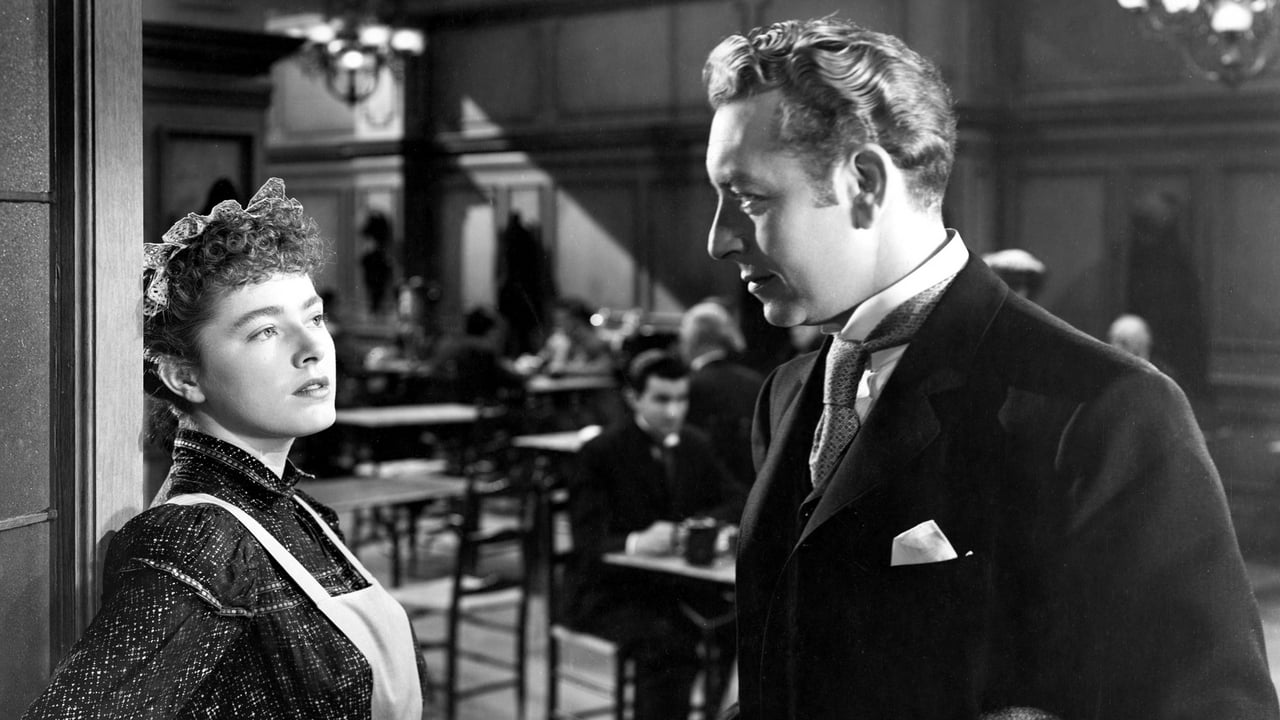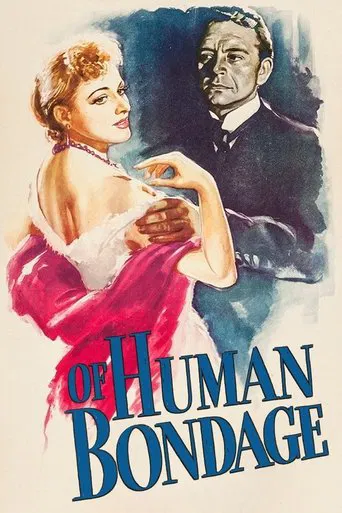

Directed by Edmund Goulding, this second adaptation of W. Somerset Maugham's novel was adapted by Catherine Turney. Paul Henreid plays a clubfooted, failed artist, gentleman who becomes a medical student that's obsessed with a low class waitress, played by Eleanor Parker. Alexis Smith plays a novelist friend who wishes her relationship with Henreid could develop into something more. Patric Knowles and Marten Lamont play fellow medical student friends of Henreid's, Henry Stephenson one of their professors. Edmund Gwenn plays a father who's family befriends Henreid in his time away from Parker; Janis Paige plays Gwenn's comely young daughter who's infatuated with Henreid's character. Una O'Connor appears for less than a cameo as a landlord's wife; her principal purpose seems to be to glare disapprovingly at Parker when she turns up at Henreid's.Philip Carey (Henreid) meets Nora Nesbitt (Smith) in Paris just after he'd decided he wasn't good enough to continue to pursue being an artist. So he returns to London where his wealthy uncle had setup a trust for him that would pay his way through medical school. A fellow student named Dunsford (Lamont) has noticed that Philip appears to have little interest in women, but asks him to accompany him to meet a woman with whom he's found an interest anyway. Philip is surprised to learn that Dunsford has been admiring a common waitress from afar, and that he hasn't even been introduced to her. They both then meet her, Mildred Rogers (Parker), with Philip convincing his friend that the waitress is not only rude, but also not worthy of him. Though they leave, Philip's vanity gets the better of him and he returns to the restaurant the next evening determined to make her interested in him. She seems only to enjoy the company of a more regular customer named Miller (Richard Nugent), who makes her laugh. However, he persuades her to go out with him to a play. Briefly, because she doesn't seem to have anything else to do, Mildred allows Philip to spend what little money he has on her before Miller returns to town. She then breaks a date with him and an ugly argument throws Philip into a funk over the course of a couple of months which his fellow medical student friends notice. But when he learns that Mildred has apparently run off to marry Miller, his spirits brighten as if he'd been freed from his "bondage" to her.Nora sends him her latest published work and then visits Philip in London. They spend a great deal of time together, but it becomes to clear to Nora that her love for Philip is returned only as friendship. She doesn't know it yet, but Mildred is still in Philip's blood, which becomes clear when he sees her again and breaks his relationship with Nora permanently. Mildred is pregnant with Miller's child, who wasn't ever her husband after all since he was a married man already. Philip helps her anyway and takes her away to Brighton, where there's a beach. He talks with her about the future, that he'll willingly adopt her baby and marry her, but then he makes the fatal mistake of introducing her to his other medical student friend Harry Griffiths (Knowles). Griffiths is a carefree, handsome womanizer who soon has Mildred laughing such that Philip's plans are ruined when she leaves him again for another man.Fortunately for Philip, while listening to Dr. Tyrell (Stephenson) give a lecture about gout, he meets the patient Mr. Athelny (Gwenn). Athelny is a kind gentleman who's not willing to give up all the foods he loves just to allow him to walk without a cane; in that respect, he shares a limp with the clubfooted Philip. Athelny and Philip becomes fast friends such that Philip becomes a regular at the Athelny household every Sunday for dinner. Isobel Elsom plays Mrs. Athelny. His gentlemanly ways and pleasant (at least) facial appearance attracts the attention of Athelny's oldest (almost 17 year old) daughter Sally (Paige), though neither man notice her infatuation. Unfortunately for Philip, he sees Mildred once again, on the streets with rouge on her cheeks. Concerned for the health of her and her many months old child, he gives her a place to stay, as her cook & housekeeper, in his residence. Mildred tells Mrs. Foreman (O'Connor) that she's Philip's wife to set her at ease, but gets a scowling disapproving look from the landlady in any case.Philip neglects his relationship with the Athelny's anyway, even though he refuses to maintain any more than a platonic relationship with Mildred. Mildred is enraged by Philip's lack of interest in her which comes to a boil at Christmas time when she tries to seduce him. After he spurns her, she chases him out of his own residence with a vicious diatribe and then proceeds to burn his only money and trash his apartment. Philip manages to make it to the Athelny's for some brief holiday cheer before he goes out into the rainy night to catch pneumonia. Ironically it's Griffiths that saves him, but when Philip is strong enough to return to Athelny in the spring, he is met with a cold attitude towards him which he doesn't understand. Sally greets him pleasantly and he seems to notice her for the first time. He then finds out that Athelny believes Philip has a wife and child. Leaving there, he returns to Griffiths where he tries to kill himself. Griffiths then takes him to a hospital where Mildred is breathing her last breaths in a ward for contagious patients; the baby had already died. Philip returns to the Athelny's where he learns of Sally's infatuation. After convincing her formerly reluctant father that he didn't in fact have a wife & child, and with his burden clearly lifted by Mildred's death, Philip kisses Sally as her approving father closes the door.
... View More***slight spoiler*****I just finished watching Of Human Bondage on TCM. I kept thinking throughout as Paul Henried limped around how that man can wear the hell out of a suit. To add to what others have said, I was surprised by this version of the film. I was expecting a dull rendition, especially after the tours de force by Davis and Howard in an earlier rendition. Despite lukewarm reviews, I loved it! An elegant film overall and well crafted, beautifully decorated and photographed in high contrast black and white, full of angled looming shadows, almost oppressively so, and small pools of light, sometimes unkind light, a manifest expression of Philip Carey's inner life. Gestures and movement are also important, often more so than words.I thought Paul Henreid was fantastic in it as well as Eleanor Parker; I think he gets short shrift relative to the star power of the female role. He seemed like a man trapped, who knew he was trapped and was helpless to do anything about it except to careen between cruelty and kindness. His experience has a compelling immediacy, of the moment and so does his story. I never had seen Paul Henreid in such a different role, where he lacked confidence and could be awkward and despairing, coarse and primal in a way that made me uncomfortable to see such naked need and helplessness. And still, the character had a grace, a redemptive quality that would peek out in spare, quiet moments.I especially loved the simplicity of his wordless visit to Mildred at the end; it was as if he were carressing a dying animal. And then he was quietly, without fanfare, released. His obsession is never explained because it doesn't really matter. His experience matters. The director captures this beautifully.This film and the crafting of its themes reminds me very much of the 40's version of A Razor's Edge with Tyrone Power. It turns out Edmund Goulding directed both.8.5 stars out of 10
... View MoreIf you love old great classic films in B&W and great actors, this is a must see film. This 1946 Film Classic had all time greats, like Paul Henreid,(Philip Carey),"Casablanca",'42 who was very handsome and had a handicap, and fell in love with the wrong lady, Eleanor Parker(Mildred Rogers),"A Hole In The Head",'59. Mildred took advantage of Philip's great love for her and wound up in many other men's beds. Edmund Gwenn,(Athelmy),"The Keys of the Kingdom",'44 came to the aid of Philip and gave a great supporting actor's role through out the entire picture. Athelmy even introduced his daughter, Janis Paige(Sally Athelmy),"Two Guys From Milwaukee",'46 to Philip, who seemed to warm to her beautiful good looks and warm and kind ways! A great actress Alexis Smith,(Nora Nesbitt),"Rhapsody in Blue",'45, also appeared in this film and gave a great supporting role. Edmund Gwenn and Eleanor Parker made this film into an all time film Classic for many generations to view and enjoy!
... View MoreFirst of all to state the obvious, it must be said that the criminally underrated Eleanor Parker is not the great Bette Davis, who shot to fame with her stunning interpretation in the 1934 original. But then again WHO IS ? Parker should have received the same accolades for her own stunning performance, but the powers that be decided instead to withdraw this version from circulation for many, many years, and she would have to wait another couple of years to enjoy even a modicum of the same recognition. A box office flop on release, this film was one that I had always wanted to see just to make up my own mind. As Davis is my favourite actress, I was ready to agree with all the misguided so-called critics over the years. That is not to say that I wasn't aware of how good Parker could be: witness her outstanding performances in DETECTIVE STORY (1951); INTERRUPTED MELODY (1955) (as polio stricken opera star Marjorie Lawrence) and best of all, her mesmerising tour de force in CAGED (1950). All of these were Oscar nominated as well, so she wasn't without her admirers. With it's appalling reputation preceding it however, to my absolute astonishment, this version of W. Somerset Maugham's story is excellent in it's own right, and Parker's immersion into the role is the reason. Why has this woman never received her due credit. Why has she disappeared from the screen ? While Davis, Hepburn, Stanwyck, and mid period Crawford thoroughly deserve their legendary status, the likes of Parker and another forgotten great Susan Hayward, wait to be rediscovered. WATCH THIS AND SEE WHY.
... View More